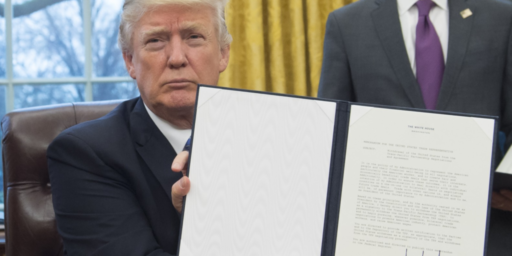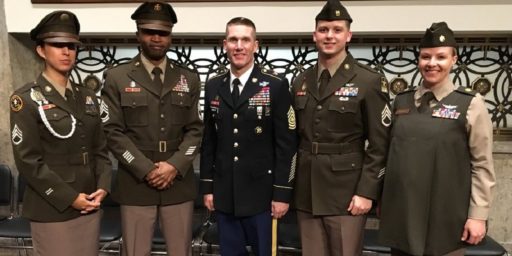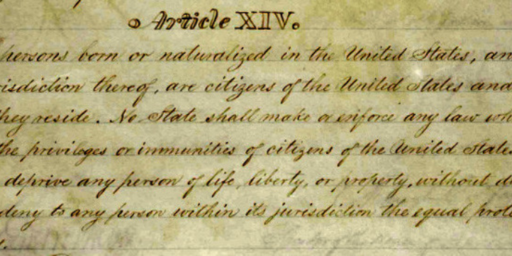Military as Path to Citizenship
A front page story in today’s WaPo highlights the rather large number of non-citizens currently serving in our armed forces.
In a crowd of nearly 100 eager faces of newly sworn-in citizens on the grounds of Mount Vernon yesterday, three men in the front row stood out. Their black shoes shone to glossy perfection*. Their backs were ramrod straight. One wore the crisp white uniform of the Navy. Another, the drab khaki of the Marines and a third, the dress uniform** of the Army. Two had campaign ribbons from serving in Iraq or Afghanistan.
Until yesterday, the sailor, the Marine and the soldier were among more than 40,000 “green card” service members — non-citizens serving in the U.S. military. After swearing to defend the Constitution, Petty Officer Reginald Cherubin, 30, Marine Sgt. Brian Joseph, 38, and Army Sgt. Jeremy Tattrie, 24, joined another group: the more than 26,000 service members who have become U.S. citizens since the Iraq war began and the Bush administration expedited the citizenship process for military members. Seventy-five service members have received their citizenship posthumously since then.
A nice story, to be sure, but worthy of front page treatment during the week? Here’s the hook:
The three were sworn in as the military and the country are engaged in a vigorous, divisive debate about what place immigrants should have in the armed forces and society at large. The ceremony at George Washington’s home took place as lawmakers on the other side of the Potomac River began debating a controversial immigration bill that would, among other provisions, grant legal status to virtually all undocumented workers, create a temporary worker program and tighten border controls. The bill also calls for allowing the military to be a path to citizenship for a limited number of undocumented immigrants — those who were brought to the United States when they were younger than 16 and have been living here for at least five years.
The ceremony also came as some military experts want to open the armed forces to undocumented immigrants and foreign recruits to fill the ranks as the Army and Marines plan troop increases. Critics fear a flood of recruits lured solely by the promise of legal status. “A very large number of non-citizens could change the purpose of the military from the defense of the country to a job and a way to get a foot in the door of the United States,” said Mark Krikorian, executive director of the Center for Immigration Studies, which advocates restrictions on immigration. “It becomes a kind of mercenary thing.” Others argue that a liberalized policy could improve the armed forces. Margaret Stock, an immigration lawyer, Army officer and law professor at West Point, noted that during wartime, military brass can already sign up undocumented immigrants, some of whom have received citizenship. “I think that it’s great for the military to allow people to enlist who are qualified to be in the military,” Stock said. “Having papers doesn’t tell me whether someone’s qualified or not.”
Official military policy is to accept legal permanent residents with green cards, although Congress in January 2006 gave military leaders wartime powers to enlist anyone they deem “vital to the national interest.”
This is an interesting sleight-of-hand by the Post. Even though my instincts on immigration policy are libertarian, the major controversy over the current bill is what to do with illegal aliens. Those who are here and eligible to sign up for military service are legal residents.
As to the issue of relying on non-citizens to meet shortfalls in military recruitment, I share Krikorian’s concerns. Stock is certainly right that citizenship has no bearing on the technical skills necessary to be a good soldier. Still, there’s something unseemly about farming out the burdens of fighting our wars to immigrants. That said, it strikes me as more than reasonable to give these men expedited citizenship.
________
*Almost certainly, they were wearing Corfram or other shoes with a permanent factory shine.
**Actually, this is now being transitioned in as the standard service uniform.





B-b-b-but this is how the Roman Empire fell — barbarian legionaries!
As a platoon sergeant in the Seventh army in Germany, I had a number of immigrants in my platoon. Earning their citizenship the hard way. I still think it is an honor to serve your country.
Earning their citizenship the hard way. I still think it is an honor to serve your country.
But it’s not actually their country. I don’t have a problem with giving them citizenship but I’m leery of having the Army, especially its enlisted ranks, become a way station for immigrants trying to get out of poverty vice Americans doing their bit for the country.
If the Army wants fewer immigrants and more citizens, it can compete for ’em in the marketplace — wages, benefits, etc.
The Surgeon General warns that you should not hold your breath waiting for that to happen.
If they are undocumented how the heck are they going to document that they meet the qualifications?
By the way, there were a large number of non-citizens serving in the military in the early 1960s. I was on a ship assigned to a “Cold War” mission that could only be crewed by U.S. citizens. Much to our surprise, we had to leave five percent of the crew ashore (and that figure didn’t even include the Filipino stewards in officer country). Five percent doesn’t sound like much, but they were pretty critical personnel in several departments. It was a tough deployment in that respect.